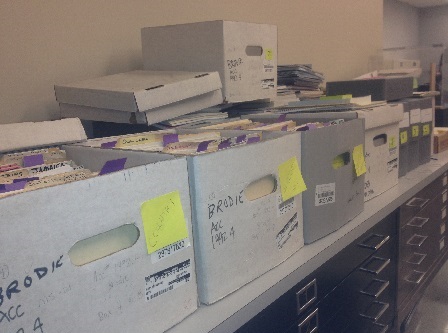Last fall HCI-PSAR facilitated a pilot internship program that paired emerging archivists in need of hands-on experience with small repositories in need of processing assistance and large repositories willing to train and supervise the intern. We matched intern Tracy Ulmer with the Chestnut Hill Historical Society and Drexel University College of Medicine Archives & Special Collections. Tracy reflected on the Jessie Laird Brodie, M.D. papers, the Philadelphia Canoe Club records, and her other experiences in the blog below.
By Claire (Tracy) Ulmer
This fall I processed two collections as part of the HCI-PSAR Internship Pilot Program, facilitated by the Historical Society of Pennsylvania's Hidden Collections Initiative for Pennsylvania Small Archival Repositories (HCI-PSAR). As part of this project I received guidance and supervision from professional archivists at the Drexel University College of Medicine Archives & Special Collections where I processed the Jessie Laird Brodie, M.D. papers and at the Chestnut Hill Historical Society, where I processed the Philadelphia Canoe Club records.
The end goal of this internship pilot program was to make better known and more accessible the hidden archival collections held at the numerous small repositories throughout the five-county Philadelphia area (as well as to work out any kinks in the program!). While I certainly aided in this end goal, it was not the end goal I had for myself.
Other than an assignment for an archival studies class at Drexel University where I processed a collection of just 50 pages, I had no experience in processing archival collections. Sure, I had all the theory, knew all the lingo… but processing a comparatively small-scale class assignment and an actual collection are two very different things! This internship was a chance for me to merge my knowledge with experience.
I first processed the personal papers of Jessie Laird Brodie, M.D. and then the organizational papers of the Philadelphia Canoe Club. Over the months I learned first-hand what I recall discussing in all of my archival studies classes: what one wants to accomplish following archival theory is very different from what one might be capable of accomplishing given situational circumstances! It is theory versus reality, and it can be as frustrating as all get out.

Jessie Laird Brodie, M.D. papers, before processing
Time, of course, is always a limiting factor, and my biggest challenge as I felt the pinch while processing both collections, particularly when I had to remind myself that I did not have time for minutia. Time versus thoroughness became my internal mantra. This factor inevitably led to compromise between the ideal and reality. For example, for the Jessie Laird Brodie, M.D. papers I was not able to organize or describe the 800 some odd 35 mm slides beyond, “The slides appear to be of Brodie’s travels outside the United States and are generally labeled with the country shown in the slides, but do not always have a date.” While frustrating, I had to accept that this area of the collection was simply not going to receive as much attention in terms of physical or intellectual arrangement.

Jessie Laird Brodie, M.D. papers, after processing
Limiting how much attention I could give the two collections was a particular difficulty for me. The desire to get into every nook and cranny, figuratively speaking, was immense. As someone looking to enter the archival profession, where such detailed work is generally not possible due to time constraints, funding, and backlogs, pulling back from the minute was something I had to remind myself of every day I worked on the collections. Certainly starting with a collection of personal papers this was more difficult, but working on an organizational collection at the Chestnut Hill Historical Society was comparatively much easier. Folder labels were typically obvious and straightforward; for the most part I did not have to spend time double-checking that the contents of a folder were what the folder title purported them to be.
After working with two types of archival collections, there were two key principles I have since taken in mind: there are numerous ways to process any given collection; time and experience will help me to ferret out the best way to process various types of collections in the shortest amount of time possible. Also: always double check to make sure you pull all of the boxes belonging to one collection so you do not end up with a surprise box at the end when you go to put the collection away!
View Tracy's finding aids for the Jessie Laird Brodie, M.D. papers and the Philadelphia Canoe Club records.
In case you missed it, also check out the blog post by our other HCI-PSAR intern, Sarah.

